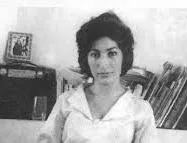
Forough Farrokhzad was a trailblazing Iranian poet and filmmaker who revolutionized Persian literature and cinema. Born in Tehran in 1934, she defied societal expectations with her fearless exploration of themes such as love, desire, and individuality. Her debut collection, The Captive (1955), introduced a raw and unapologetic voice that resonated deeply, challenging the constraints placed on women in a patriarchal society. Farrokhzad’s work illuminated personal truths while addressing universal struggles, breaking barriers in both form and content.
Her later collections, such as The Rebellion and Another Birth, solidified her as a visionary in Persian modernist poetry. With its rich imagery and introspection, Another Birth remains a cornerstone of Persian literary tradition. Her writing delved into human emotions with an honesty that was both daring and transformative, establishing her as a beacon of artistic authenticity. Farrokhzad’s work transcended cultural boundaries, reflecting a longing for freedom and self-expression.
Farrokhzad’s artistry extended beyond poetry to filmmaking, where she made a profound impact with her 1962 documentary, The House is Black. A poignant portrayal of leprosy patients in Iran, the film fused poetic narration with stark visuals, offering a powerful commentary on human suffering and resilience. It garnered international acclaim and showcased her ability to intertwine art and social issues with unparalleled depth.
Despite facing criticism and ostracism for her unconventional life, Farrokhzad’s legacy endures as a symbol of courage and creativity. Her untimely death in a car accident in 1967, at the age of 32, cut short a life brimming with potential. Yet, her work continues to inspire, reminding us of the transformative power of art. “To be born again, you must first shatter,” she wrote, leaving behind a message of resilience and renewal that echoes across generations.


